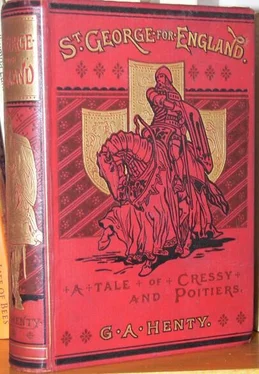G. Henty - St. George for England - A Tale of Cressy and Poitiers
Здесь есть возможность читать онлайн «G. Henty - St. George for England - A Tale of Cressy and Poitiers» весь текст электронной книги совершенно бесплатно (целиком полную версию без сокращений). В некоторых случаях можно слушать аудио, скачать через торрент в формате fb2 и присутствует краткое содержание. Жанр: Старинная литература, на английском языке. Описание произведения, (предисловие) а так же отзывы посетителей доступны на портале библиотеки ЛибКат.
- Название:St. George for England: A Tale of Cressy and Poitiers
- Автор:
- Жанр:
- Год:неизвестен
- ISBN:нет данных
- Рейтинг книги:3 / 5. Голосов: 1
-
Избранное:Добавить в избранное
- Отзывы:
-
Ваша оценка:
- 60
- 1
- 2
- 3
- 4
- 5
St. George for England: A Tale of Cressy and Poitiers: краткое содержание, описание и аннотация
Предлагаем к чтению аннотацию, описание, краткое содержание или предисловие (зависит от того, что написал сам автор книги «St. George for England: A Tale of Cressy and Poitiers»). Если вы не нашли необходимую информацию о книге — напишите в комментариях, мы постараемся отыскать её.
St. George for England: A Tale of Cressy and Poitiers — читать онлайн бесплатно полную книгу (весь текст) целиком
Ниже представлен текст книги, разбитый по страницам. Система сохранения места последней прочитанной страницы, позволяет с удобством читать онлайн бесплатно книгу «St. George for England: A Tale of Cressy and Poitiers», без необходимости каждый раз заново искать на чём Вы остановились. Поставьте закладку, и сможете в любой момент перейти на страницу, на которой закончили чтение.
Интервал:
Закладка:
So saying, the smith retired to his bed of rushes in the smithy, and soon afterward the tired visitor, with her baby, lay down on the rushes in front of the fire, for in those days none of the working or artisan class used beds, which were not indeed, for centuries afterward, in usage by the common people.
In the morning Geoffrey Ward found that his guest desired to find one Giles Fletcher, a maker of bows.
"I know him well," the smith said. "There are many who do a larger business, and hold their heads higher, but Giles Fletcher is well esteemed as a good workman, whose wares can be depended upon. It is often said of him that did he take less pains he would thrive more; but he handles each bow that he makes as if he loved it, and finishes and polishes each with his own hand. Therefore he doeth not so much trade as those who are less particular with their wares, for he hath to charge a high price to be able to live. But none who have ever bought his bows have regretted the silver which they cost. Many and many a gross of arrow-heads have I sold him, and he is well-nigh as particular in their make as he is over the spring and temper of his own bows. Many a friendly wrangle have I had with him over their weight and finish, and it is not many who find fault with my handiwork, though I say it myself; and now, madam, I am at your service."
During the night the wayfarer's clothes had been dried. The cloak was of rough quality, such as might have been used by a peasant woman; but the rest, though of somber color, were of good material and fashion. Seeing that her kind entertainers would be hurt by the offer of money, the lady contented herself with thanking Madge warmly, and saying that she hoped to come across the bridge one day with Dame Fletcher; then, under the guidance of Geoffrey, who insisted on carrying the boy, she set out from the smith's cottage. They passed under the outer gate and across the bridge, which later on was covered with a double line of houses and shops, but was now a narrow structure. Over the gateway across the river, upon pikes, were a number of heads and human limbs. The lady shuddered as she looked up.
"It is an ugly sight," the smith said, "and I can see no warrant for such exposure of the dead. There are the heads of Wallace, of three of Robert Bruce's brothers, and of many other valiant Scotsmen who fought against the king's grandfather some twenty years back. But after all they fought for their country, just as Harold and our ancestors against the Normans under William, and I think it a foul shame that men who have done no other harm should be beheaded, still less that their heads and limbs should be stuck up there gibbering at all passers-by. There are over a score of them, and every fresh trouble adds to their number; but pardon me," he said suddenly as a sob from the figure by his side called his attention from the heads on the top of the gateway, "I am rough and heedless in speech, as my sister Madge does often tell me, and it may well be that I have said something which wounded you."
"You meant no ill," the lady replied; "it was my own thoughts and troubles which drew tears from me; say not more about it, I pray you."
They passed under the gateway, with its ghastly burden, and were soon in the crowded streets of London. High overhead the houses extended, each story advancing beyond that below it until the occupiers of the attics could well-nigh shake hands across. They soon left the more crowded streets, and turning to the right, after ten minutes' walking, the smith stopped in front of a bowyer shop near Aldgate.
"This is the shop," he said, "and there is Giles Fletcher himself trying the spring and pull of one of his bows. Here I will leave you, and will one of these days return to inquire if your health has taken aught of harm by the rough buffeting of the storm of yester-even."
So saying he handed the child to its mother, and with a wave of the hand took his leave, not waiting to listen to the renewed thanks which his late guest endeavored to give him.
The shop was open in front, a projecting penthouse sheltered it from the weather; two or three bows lay upon a wide shelf in front, and several large sheaves of arrows tied together stood by the wall. A powerful man of some forty years old was standing in the middle of the shop with a bent bow in his arm, taking aim at a spot in the wall. Through an open door three men could be seen in an inner workshop cutting and shaping the wood for bows. The bowyer looked round as his visitor entered the shop, and then, with a sudden exclamation, lowered the bow.
"Hush, Giles!" the lady exclaimed; "it is I, but name no names; it were best that none knew me here."
The craftsman closed the door of communication into the inner room. "My Lady Alice," he exclaimed in a low tone, "you here, and in such a guise?"
"Surely it is I," the lady sighed, "although sometimes I am well-nigh inclined to ask myself whether it be truly I or not, or whether this be not all a dreadful dream."
"I had heard but vaguely of your troubles," Giles Fletcher said, "but hoped that the rumors were false. Ever since the Duke of Kent was executed the air has been full of rumors. Then came news of the killing of Mortimer and of the imprisonment of the king's mother, and it was said that many who were thought to be of her party had been attacked and slain, and I heard——" And there he stopped.
"You heard rightly, good Giles, it is all true. A week after the slaying of Mortimer a band of knights and men-at-arms arrived at our castle and demanded admittance in the king's name. Sir Roland refused, for he had news that many were taking up arms, but it was useless. The castle was attacked and, after three days' fighting, was taken. Roland was killed, and I was cast out with my child. Afterward they repented that they had let me go, and searched far and wide for me; but I was hidden in the cottage of a wood-cutter. They were too busy in hunting down others whom they proclaimed to be enemies of the king, as they had wrongfully said of Roland, who had but done his duty faithfully to Queen Isabella, and was assuredly no enemy of her son, although he might well be opposed to the weak and indolent king, his father. However, when the search relaxed I borrowed the cloak of the good man's wife and set out for London, whither I have traveled on foot, believing that you and Bertha would take me in and shelter me in my great need."
"Ay, that will we willingly," Giles said. "Was not Bertha your nurse? and to whom should you come if not to her? But will it please you to mount the stairs? for Bertha will not forgive me if I keep you talking down here. What a joy it will be to her to see you again!"
So saying, Giles led the way to the apartment above. There was a scream of surprise and joy from his wife, and then Giles quietly withdrew downstairs again, leaving the women to cry in each other's arms.
A few days later Geoffrey Ward entered the shop of Giles Fletcher.
"I have brought you twenty score of arrow-heads, Master Giles," he said. "They have been longer in hand than is usual with me, but I have been pressed. And how goes it with the lady whom I brought to your door last week?"
"But sadly, Master Ward, very sadly, as I told you when I came across to thank you again in her name and my own for your kindness to her. She was but in poor plight after her journey; poor thing, she was little accustomed to such wet and hardship, and doubtless they took all the more effect because she was low in spirit and weakened with much grieving. That night she was taken with a sort of fever, hot and cold by turns, and at times off her head. Since then she has lain in a high fever and does not know even my wife; her thoughts ever go back to the storming of the castle, and she cries aloud and begs them to spare her lord's life. It is pitiful to hear her. The leech gives but small hope for her life, and in troth, Master Ward, methinks that God would deal most gently with her were he to take her. Her heart is already in her husband's grave, for she was ever of a most loving and faithful nature. Here there would be little comfort for her—she would fret that her boy would never inherit the lands of his father; and although she knows well enough that she would be always welcome here, and that Bertha would serve her as gladly and faithfully as ever she did when she was her nurse, yet she could not but greatly feel the change. She was tenderly brought up, being, as I told you last week, the only daughter of Sir Harold Broome. Her brother, who but a year ago became lord of Broomecastle at the death of his father, was one of the queen's men, and it was he, I believe, who brought Sir Roland Somers to that side. He was slain on the same night as Mortimer, and his lands, like those of Sir Roland, have been seized by the crown. The child upstairs is by right heir to both estates, seeing that his uncle died unmarried. They will doubtless be conferred upon those who have aided the young king in freeing himself from his mother's domination, for which, indeed, although I lament that Lady Alice should have suffered so sorely in the doing of it, I blame him not at all. He is a noble prince and will make us a great king, and the doings of his mother have been a shame to us all. However, I meddle not in politics. If the poor lady dies, as methinks is well-nigh certain, Bertha and I will bring up the boy as our own. I have talked it over with my wife, and so far she and I are not of one mind. I think it will be best to keep him in ignorance of his birth and lineage, since the knowledge cannot benefit him, and will but render him discontented with his lot and make him disinclined to take to my calling, in which he might otherwise earn a living and rise to be a respected citizen. But Bertha hath notions. You have not taken a wife to yourself, Master Geoffrey, or you would know that women oft have fancies which wander widely from hard facts, and she says she would have him brought up as a man-at-arms, so that he may do valiant deeds, and win back some day the title and honor of his family."
Читать дальшеИнтервал:
Закладка:
Похожие книги на «St. George for England: A Tale of Cressy and Poitiers»
Представляем Вашему вниманию похожие книги на «St. George for England: A Tale of Cressy and Poitiers» списком для выбора. Мы отобрали схожую по названию и смыслу литературу в надежде предоставить читателям больше вариантов отыскать новые, интересные, ещё непрочитанные произведения.
Обсуждение, отзывы о книге «St. George for England: A Tale of Cressy and Poitiers» и просто собственные мнения читателей. Оставьте ваши комментарии, напишите, что Вы думаете о произведении, его смысле или главных героях. Укажите что конкретно понравилось, а что нет, и почему Вы так считаете.












